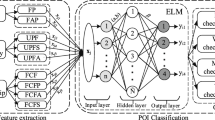Abstract
Due to the enormous use of mobile applications and the wide spread of location-based services, as Foursquare, google maps, Facebook check-ins, it became a must to focus on studying these data and its impact on our social norms. In this paper, we are tackling the location novelty problem, which evaluates the user’s curiosity to explore new places. In order to maintain a better service and offer new services, such as recommending new places, optimizing marketing campaigns, we conducted these experiments to classify the next check-ins to be either Novel or regular. We can predict the novelty of the next Point of Interest (POI) up to 82%, by extracting different types of features, in space and time, and using boosting trees.
Access this chapter
Tax calculation will be finalised at checkout
Purchases are for personal use only
Similar content being viewed by others
References
Lian, D., Xie, X., Zheng, V.W., Yuan, N.J., Zhang, F., Chen, E.: CEPR: a collaborative exploration and periodically returning model for location prediction. ACM Trans. Intell. Syst. Technol. 6(1), 1–27 (2015)
Cho, E., Myers, S.A., Leskovec, J.: Friendship and mobility: user movement in location-based social networks. In: ACM SIGKDD International Conference on Knowledge Discovery and Data Mining (2011)
Zheng, Y.: Mining interesting locations and travel sequences from GPS trajectories. In: WWW, Madrid (2009)
Zheng, Y.: GeoLife: a collaborative social networking service among user, location and trajectory. In: UbiComp, Seoul, Korea (2008)
Zheng, Y.: GeoLife: a collaborative social networking service among user, location and trajectory. IEEE Data Eng. Bull. 33, 32–40 (2010)
Chen, T., Guestrin, C.: XGBoost: a scalable tree boosting system. In: Proceedings of the 22nd ACM SIGKDD International Conference on Knowledge Discovery and Data Mining - KDD 2016 (2016)
Distributed machine learning toolkit. http://www.dmtk.io/. Accessed 10 Jan 2017
Pan, J.-S., Polycarpou, M.M., Woźniak, M., Carvalho, A.C.P.L.F., Quintián, H., Corchado, E. (eds.) Hybrid Artificial Intelligent Systems. Springer, Heidelberg (2013)
Cho, S.-B.: Exploiting machine learning techniques for location recognition and prediction with smartphone logs. Neurocomputing 176, 98–106 (2016)
Ashbrook, D., Starner, T.: Using GPS to learn significant locations and predict movement across multiple users. Pers. Ubiquit. Comput. 7(5), 275–286 (2003)
Gambs, S.: Next place prediction using mobility Markov chains. In: Eurosys’ MPM (2012)
Mathew, W., Raposo, R., Martins, B.: Predicting future locations with hidden Markov models. In: Proceedings of the 2012 ACM Conference on Ubiquitous Computing - UbiComp 2012 (2012)
Wang, Y., Yuan, N.J., Lian, D., Xu, L., Xie, X., Chen, E., Rui, Y.: Regularity and conformity: location prediction using heterogeneous mobility data. In: Proceedings of the 21th ACM SIGKDD International Conference on Knowledge Discovery and Data Mining - KDD 2015 (2015)
Zheng, Y., Zhang, L., Ma, Z., Xie, X., Ma, W.-Y.: Recommending friends and locations based on individual location history. ACM Trans. Web 5(1), 1–44 (2011)
Haversine formula. Wikipedia https://en.wikipedia.org/wiki/Haversine_formula. Accessed 17 Jan 2017
Ram, A., Jalal, S., Jalal, A.S., Kumar, M.: A density based algorithm for discovering density varied clusters in large spatial databases. Int. J. Comput. Appl. 3(6), 1–4 (2010)
James Bergstra, Y.B.: Random search for hyper-parameter optimization. J. Mach. Learn. Res. 13, 281–305 (2012)
Author information
Authors and Affiliations
Corresponding author
Editor information
Editors and Affiliations
Rights and permissions
Copyright information
© 2017 Springer International Publishing AG
About this paper
Cite this paper
Yasser, K., Hemayed, E. (2017). Novelty Detection for Location Prediction Problems Using Boosting Trees. In: Gervasi, O., et al. Computational Science and Its Applications – ICCSA 2017. ICCSA 2017. Lecture Notes in Computer Science(), vol 10405. Springer, Cham. https://doi.org/10.1007/978-3-319-62395-5_13
Download citation
DOI: https://doi.org/10.1007/978-3-319-62395-5_13
Published:
Publisher Name: Springer, Cham
Print ISBN: 978-3-319-62394-8
Online ISBN: 978-3-319-62395-5
eBook Packages: Computer ScienceComputer Science (R0)




